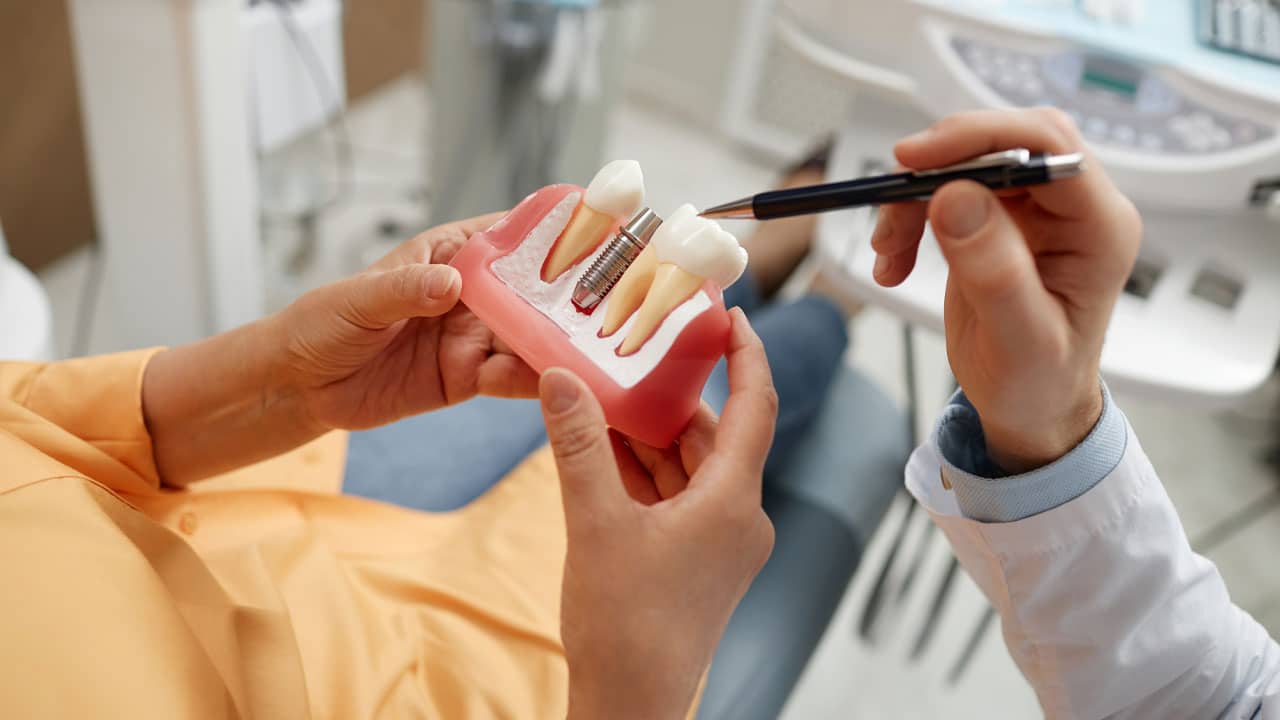
When replacing missing teeth, dental implants and dental bridges are two of the most common options. Both offer solutions to restore your smile, functionality, and oral health, but they do so in different ways. Understanding the differences between these two solutions can help you decide which is best for your smile.
What Are Dental Implants?
Dental implants are the only permanent solution to replace missing teeth. During the procedure, your dentist surgically inserts a titanium post into the jawbone, which acts as a replacement for the tooth root.
Over time, the implant fuses with the bone – a process known as osseointegration – creating a sturdy foundation. An abutment (connector) is then placed on top of the implant, upon which a crown is attached, giving the appearance and function of a natural tooth.
Pros of Dental Implants:
- Durability. Implants are durable and can last a lifetime with proper care, although the crown may eventually have to be replaced after around 20 years due to wear and tear.
- Bone health. They prevent jawbone loss by stimulating bone cell growth. This prevents your remaining teeth from shifting and maintains the integrity of your facial structure, preventing an aged appearance.
- Aesthetics and functionality. Implants look and function like natural teeth, improving speech and eating capabilities while boosting your self-confidence.
- Independent structure. They do not rely on adjacent teeth for support, preserving the health and integrity of surrounding teeth.
Cons of Dental Implants:
- Surgical procedure. Implants require surgery and a healing period that can last several months but have a success rate of over 95%.
- Cost. They are often more expensive upfront than other tooth replacement options. However, as a permanent restoration, they require fewer repairs and replacements, ultimately reducing the cost of the lifetime of the implant.
- Medical conditions. Certain medical conditions like uncontrolled diabetes, immune system disorders, and severe osteoporosis may preclude some patients from being good candidates for implants.
What is a Dental Bridge?
A dental bridge is a restoration that bridges the gap created by one or more missing teeth. It consists of one or two crowns for the teeth on either side of the gap and a false tooth or teeth in between. You need healthy adjacent natural teeth to support the bridge.
Pros of Dental Bridges:
- Less invasive. Non-implant-supported bridges do not require surgery, making the procedure less invasive than implants.
- Cost-effective. Generally, bridges are more affordable and have a quicker procedure time. You typically only need two visits and a short healing period to complete the treatment.
- Aesthetics. Both the crowns and the false tooth (pontic) are created from tooth-colored materials, helping give your smile a realistic appearance.
Cons of Dental Bridges:
- Durability. Bridges typically last 5 to 15 years, meaning they may need to be replaced more frequently than implants.
- Tooth structure alteration. The procedure involves removing a small layer of enamel to reshape the adjacent teeth to support the bridge. This is permanent and can be a disadvantage if these teeth are healthy.
Making the Right Choice
While both restoration methods are effective for replacing missing teeth, the decision between dental implants and bridges depends on several factors:
- Oral health. Your dentist will assess the health of your gums and jawbone. You need adequate bone density and thickness to support the metal implants, while bridges can be used even with bone loss.
- Budget. Consider your budget and whether you want a long-term investment or a more cost-effective solution. Dental implants are more expensive upfront but provide better value for money over the long term.
- Aesthetics and functionality. Both options offer a natural look, but implants provide better functionality and feel.
- Lifestyle and age. Younger patients might prefer implants for their longevity, while older individuals might opt for the less invasive nature of bridges.
Pick the Right Missing Tooth Restoration for Your Smile
If you are missing a tooth or several, contact Caputo Dental to discuss your tooth replacement options. We can help you weigh the pros and cons of each option based on your unique situation and smile goals.
Our skilled dental team is ready to assist you with missing teeth issues and develop a personalized plan that fits your needs.